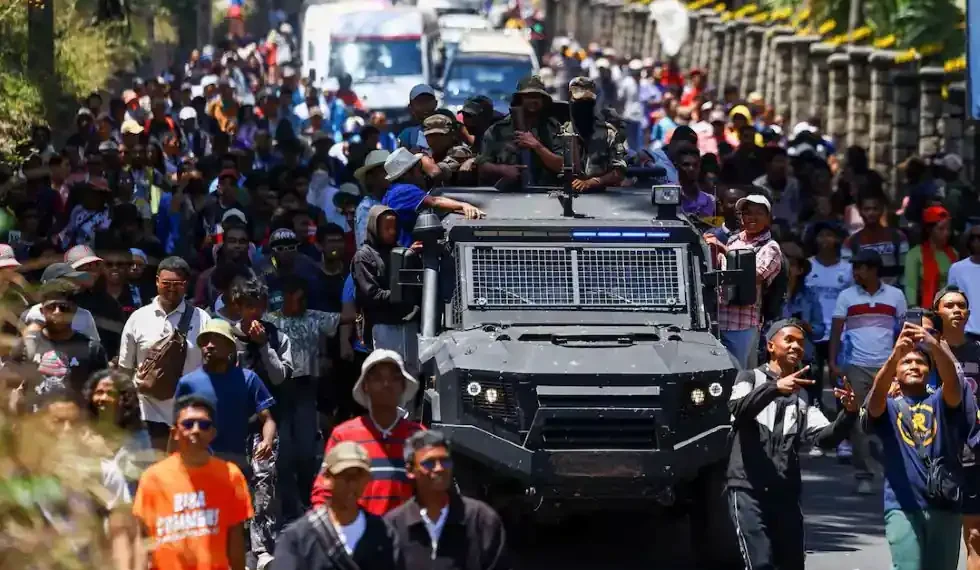Madagascar’s Andry Rajoelina Reportedly Leaves Country on French Military Plane Amid Widening Crisis
Published: October 13, 2025, 22:55 EDT
Madagascar’s political crisis deepened this week after reports emerged that President Andry Rajoelina had left the country aboard a French military aircraft, following growing anti-government protests and military defections. The reported departure, first disclosed by French radio RFI, follows days of unrest driven by youth anger over corruption, poverty, and power shortages.
Rajoelina’s Reported Exit and French Involvement
According to French broadcaster RFI, President Rajoelina was flown out of Madagascar on a French military plane after reaching an undisclosed agreement with French President Emmanuel Macron. The report, citing diplomatic sources, suggests that Rajoelina’s exit followed mounting pressure from the military and the public amid worsening protests.
The Madagascar presidency has not issued an official comment on the report despite repeated requests for clarification.
The development marks a sharp turn for Rajoelina, who has faced growing isolation in recent weeks. His loss of support from key army factions — notably the elite CAPSAT unit that once helped him seize power in 2009 — further weakened his grip on authority.
Protests Erupt Over Corruption and Basic Services
What began as demonstrations over chronic water and electricity shortages on September 25 has grown into a nationwide movement against corruption and poor governance. Thousands of mostly young protesters, many from Gen Z, have flooded the streets of Antananarivo and other cities, demanding the president’s resignation and systemic reform.
Protesters have accused the government of enriching itself while living standards stagnate. Madagascar’s economy remains one of the weakest in Africa, with three-quarters of its 30 million citizens living in poverty, according to World Bank data.
“I joined because in 16 years, the government has done nothing for us,” said Adrianarivony Fanomegantsoa, a 22-year-old hotel worker earning about 300,000 ariary ($67) a month. “We work hard, but we can barely afford food.”
Military Divisions Deepen the Political Crisis
Rajoelina’s authority suffered a major blow when CAPSAT, the elite army unit that backed his 2009 rise to power, switched allegiance to protesters.
On Sunday, Rajoelina warned of a possible coup attempt, claiming that rogue elements within the security forces were planning to seize control of the government.
By Monday, CAPSAT announced it was assuming command of the military and installed a new army chief. A separate faction of the gendarmerie, also sympathetic to protesters, formally declared its support for the movement during a ceremony attended by senior officials, according to Reuters correspondents on the ground.
In a related development, the president of the Senate, long viewed as a political ally of Rajoelina, was relieved of his duties amid public outrage. Jean André Ndremanjary was appointed as interim Senate leader, in line with the country’s constitutional procedure that places the Senate head in charge during a presidential vacancy.
Opposition Launches Impeachment Effort
As the protests intensify, opposition lawmakers have begun impeachment proceedings against Rajoelina.
Opposition leader Siteny Randrianasoloniaiko confirmed to Reuters that a coalition of National Assembly members is moving to formally remove the president, citing alleged corruption and failure to uphold constitutional obligations.
The move underscores the growing political momentum against Rajoelina, who once enjoyed strong control over both parliament and the military. Analysts say the opposition’s unity, combined with popular unrest, leaves him with few remaining options for political survival.
Youth-Led Movement Echoes Global Protests
The uprising in Madagascar mirrors a wave of youth-driven protests across multiple regions, including Nepal, Kenya, and Morocco, where Gen Z demonstrators have mobilized against economic hardship and entrenched elites.
Protesters in Madagascar have adopted the “One Piece” skull-and-straw-hat symbol, inspired by the Japanese manga series, which has also appeared in rallies in Africa, Asia, and Latin America. The shared iconography, observers note, has become a global emblem of generational frustration with inequality and corruption.
According to the United Nations, at least 22 people have died in clashes between demonstrators and security forces since late September, though the true toll may be higher in rural areas beyond Antananarivo.
Madagascar’s Economic and Social Struggles
Home to a youthful population — median age under 20 — Madagascar’s development challenges have deepened over decades of political turmoil.
Despite rich natural resources, the country’s GDP per capita has fallen by 45% since independence in 1960, driven by weak governance, recurrent coups, and limited access to education and healthcare.
The island’s economy depends heavily on vanilla exports, which account for the majority of global supply, as well as nickel, cobalt, shrimp, and textiles. However, fluctuating commodity prices and infrastructure gaps have stifled growth and job creation.
Political Future Uncertain
With the president’s reported departure, Madagascar’s political future remains uncertain. Under the constitution, the Senate leader is expected to serve as interim president until new elections can be organized.
However, deep divisions within the military and public distrust of political elites threaten to complicate any transition.
Regional observers warn that without rapid reforms and credible leadership, the crisis could destabilize not only Madagascar but also southern Africa’s fragile political balance.
This article was rewritten by JournosNews.com based on verified reporting from trusted sources. The content has been independently reviewed, fact-checked, and edited for accuracy, neutrality, tone, and global readability in accordance with Google News and AdSense standards.
All opinions, quotes, or statements from contributors, experts, or sourced organizations do not necessarily reflect the views of JournosNews.com. JournosNews.com maintains full editorial independence from any external funders, sponsors, or organizations.
Stay informed with JournosNews.com — your trusted source for verified global reporting and in-depth analysis. Follow us on Google News, BlueSky, and X for real-time updates.














